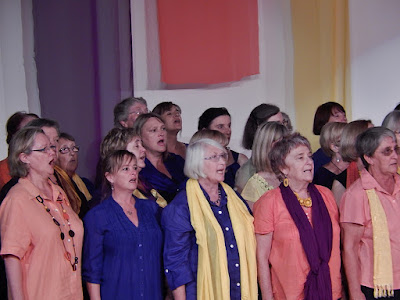Many singers in community choirs choose for themselves which part they sing. They are not allocated a part by having a vocal range test.

This might work for a while, but what if you’ve chosen the wrong part? Also, voices change over time. Maybe it’s time to change parts?
choosing a voice part
Many community choirs sing harmony in three or more parts. Often there are two parts for women, and one for any men. If there are enough singers, your choir might sing four-part SATB repertoire.
It’s usual for non-auditioned choirs not to use too many technical musical terms. So voice parts might be referred to as low, middle and high. Or tops, altos and men.
For inexperienced singers joining such a choir, it can be a bit daunting deciding which part to sing. Terms like ‘high’ and ‘low’ can be off-putting (they sound quite extreme), as can ‘soprano’ or ‘tenor’ (new singers might not have come across those terms before).
New singers may then gravitate towards what they feel is a safe and comfortable part: not too high and not too low. Or women singers might choose the highest part, believing that is where the tune always is. Male singers can find themselves torn between tenors (too high sometimes) and basses (too low sometimes).
Eventually singers will choose a part. They might move around for a few rehearsals until they find a comfortable range for their voice. Then they tend to stay there. Once and alto or tenor, always an alto or tenor!
Over time, the voice part chosen becomes part of a singer’s identity. “I’m a soprano” they will say. Yet in most community choirs, many singers will be able to sing most voice parts as the range won’t be too great. It is easy to become stuck in a voice part out of habit (and maybe because you’ve made friends in that part).
circumstances change
But things change over time. Novice singers’ ranges will expand as they begin to sing regularly. Different arrangements mean that the tune could be found in any voice part. Ageing voices might not be able to reach those high notes of old.
In which case, your original reason for choosing a voice part may no longer be valid.
I often get older singers deciding that their voice tires too readily so they leave the choir. Or singers might get bored with having what they perceive as the ‘boring’ harmonies. Or personal issues with other singers in their part mean they don’t feel comfortable there any more.
Rather than leaving the choir, or giving up singing altogether, maybe it’s time to try a different part?
It can be quite scary if you’ve been in a choir for years. It might mean getting to know new people, learning new harmonies and sitting in a different place. But if it means you can keep on singing, why not try it?
You are not defined by your voice part. Nothing ever stays the same. Be brave and try something different. You never know, you might find a whole new lease of singing life.
Chris Rowbury
Get more posts like this delivered straight to your inbox!
Click to subscribe by email.
… found this helpful?
I provide this content free of charge, because I like to be helpful. If you have found it useful, you may like to ...
... to say thank you.
